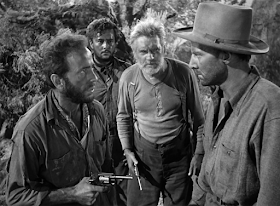 |
| Humphrey Bogart & Tim Holt in The Treasure of the Sierra Madre (1948) |
Coming in far too high on this list is The Treasure of the Sierra Madre, #38 on the AFI Top 100 and in the upper echelon of the greatest films to come out of the 1940s. Fronted by cinema's best actor and my elementary school crush (I was a weird kid), Humphrey Bogart, this picture directed by John Huston explores insights into the human psyche in a way that may seem more common in movies nowadays... but back then, it was rarely done with such depth or delicacy. Adapted from the 1927 novel by B. Traven, the film presents a terrifying truth about the search for wealth, and how greed can destroy even the most well-intentioned men.
Fred C. Dobbs (Bogart) is an American expat down on his luck in Tampico, Mexico. In 1925, he wasn't the only American with ideas of crossing the border and living like a King, only to find opportunities for wealth were much harder to come by. When he overhears a grizzled old prospector talking about gold buried deep within the wilds of the Sierra Madre mountains, he and like-minded American, Bob Curtin (Tim Holt), convince the prospector, Howard (Walter Huston), to take them out to the wild to mine for riches. Thanks to Howard's expertise, it isn't long before the men find what they're looking for... but despite the old man's warnings, as the bags of gold grow evermore plentiful, greed and paranoia threaten to tear them apart. And if the greed doesn't get them, the bandits will.
The desire that drives these three down-and-out, wannabe-frontier men is so pure and honest. They simply want to live a life better than the one they're living, and there is a true want and willingness to share that fortune. At least that's how it starts, and that's what is so compelling about this film. The transition from cooperation to mistrust, and then the devolution into absolute desperation and insanity is fascinating to watch as an audience member. You see how the men—Dobbs in particular, or rather, especially—begin to change, and the prospect of any of them losing their gold, or their lives, is enough to cause anxiety in us, as well. We may know better, that money, wealth, and gold are not everything, but it's impossible not to venture down that path of obsession with these characters, even just a little bit.

In my humble opinion, this is Humphrey Bogart's best role of his career. That he lost the Academy Award for Best Actor that year can only be attributed to clear voting oversights—or Laurence Olivier winning for Hamlet, that may also have been a factor, whatever. But nonetheless, the performance that Bogart delivers is smart, with his madness escalating incrementally throughout the course of the film. At first, you barely notice it. A line here, and side-glance there, a suspicion about Curtin, or Howard, one that is probably justified, naturally. But then it's clear that it isn't justified, and we're not the only ones who can see it now. The build-up to the film's tragic finale is thrilling and devastating to watch.
Walter Huston, who did win an Oscar for this film, sets himself apart from his co-stars by playing a very different role. The events that come to take place aren't a surprise to anyone, or at least, they shouldn't be—Howard makes a point to warn Dobbs and Curtin (and us) about the potential that an insatiable gold-lust could take them over. His experience and knowledge proves him to be invaluable, and seemingly less of a threat. Tim Holt as Curtin has a harder time standing out in the shadow of such talent. It's tough to act alongside Bogart giving the performance of a lifetime, but Holt holds his own. It's Curtin who we begin to identify with most, as his own paranoia is dulled by the shock of watching his friend go insane.
It's easy to talk about the acting in a film like this. Everyone is giving everything they've got, but the location shooting is what continues to impress me time and time again. The grit of the desert, the physically exhausting landscapes, it all creates a backdrop that is ideal for a film about mental and psychological torments. In a territory that unforgiving, no one stands a chance at coming back to civilization unchanged. Huston took full advantage of that truth in both his script and his direction, and it creates one fully-realized story.

There are many modern directors who cite this film as a favorite. Stanley Kubrick, Sam Raimi, Paul Thomas Anderson, to name a few. This is a director's movie. It has the making of a perfect, cinematic experience, and it doesn't rely on sex or melodrama to get the job done. It sets up an inevitable climax from the very beginning, and every scene, every moment, serves to deliver on that promise. John Huston directs a masterful film in The Treasure of the Sierra Madre, and as a result, it should be considered mandatory viewing for anyone claiming to love movies. Regardless of preferences, everyone should benefit from this intelligent work.
It surprises me that this film saw a drop in its AFI status between 1997 and 2007. Originally primed at the #30 spot, it's my belief it deserves to be in the Top 25, at least. I hope that in the coming incarnation, it finds its rightful place.
Rating: ★★★★★ / 5 stars
Check back next time for #37 on the list, The Best Years of Our Lives — or better yet, have your own viewing party and watch along with us!

No comments:
Post a Comment